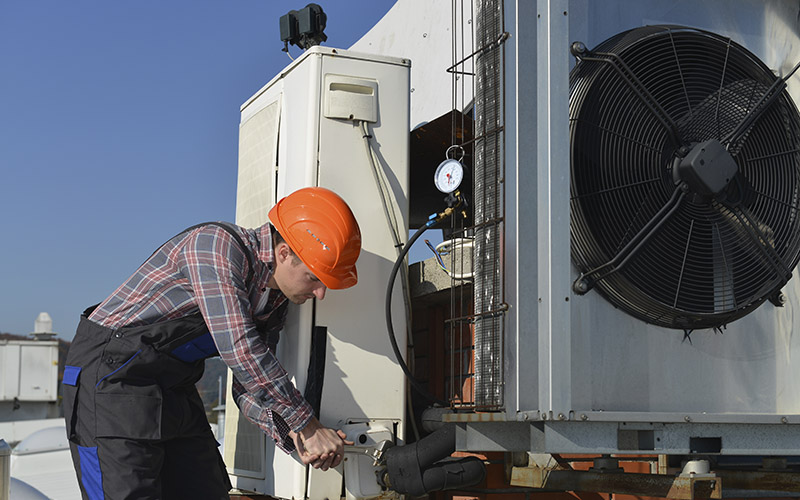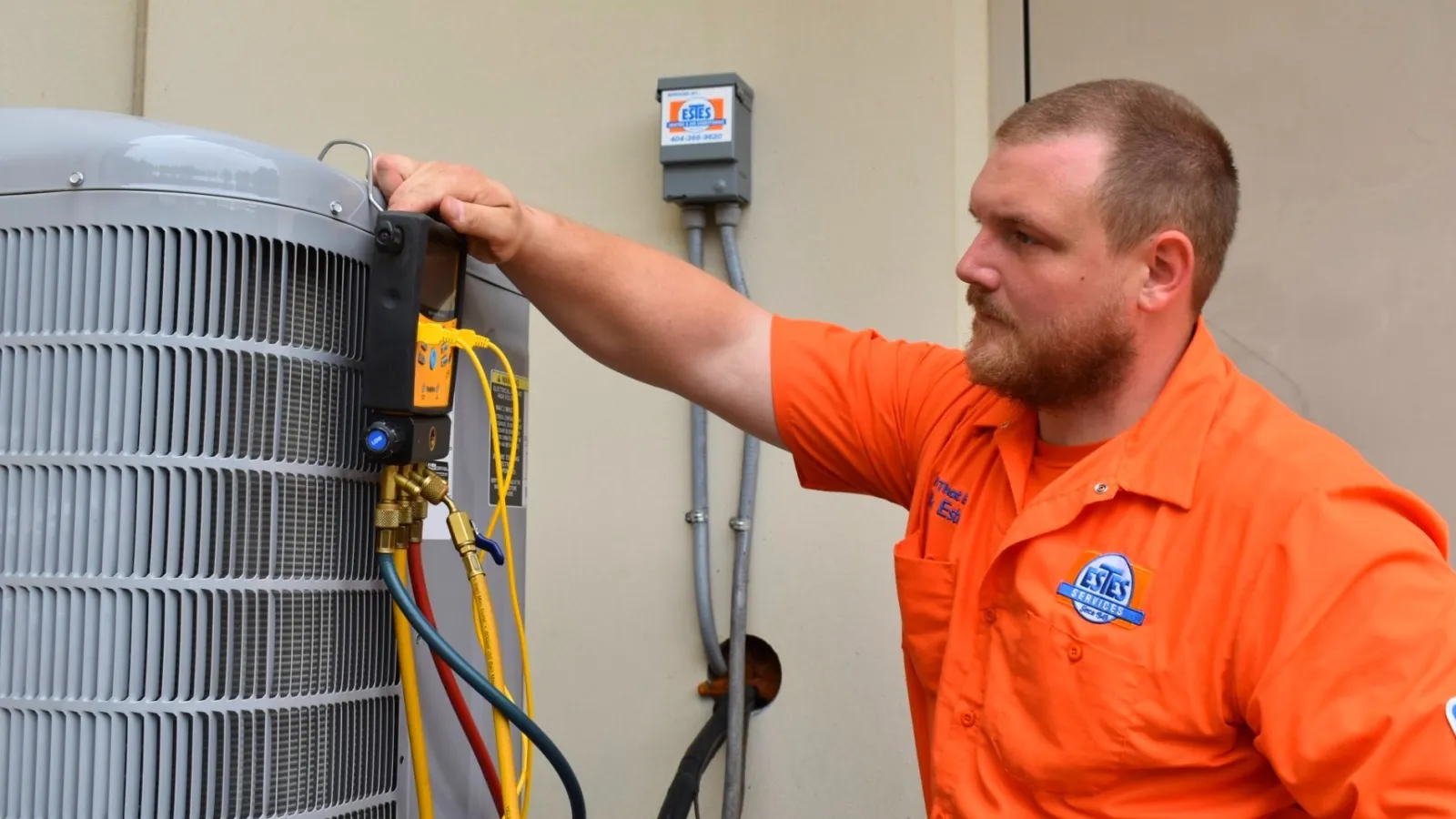What Makes a Successful heat pump installation ooltewah tn
What Makes a Successful heat pump installation ooltewah tn
Blog Article
Choosing In Between a Heatpump and Heater: Key Factors To Consider for Your A/c Demands
When examining heating choices for HVAC needs, the decision between a heatpump and a furnace can be intricate. Each system provides unique benefits customized to details climates and energy performance goals. Comprehending these differences is necessary for making an enlightened selection. Key factors such as setup prices and ecological influence additionally complicate the choice procedure. Which option truly aligns with one's convenience and sustainability preferences? The following areas will discover these considerations carefully.
Recognizing Warm Pumps: Just How They Work and Their Advantages
While many home owners consider different home heating choices, recognizing exactly how warmth pumps function and their advantages can significantly influence their decision. Heatpump operate by transferring warm instead of producing it. In the winter, they draw out heat from the outside air or ground and transfer it inside, while in the summer season, they reverse this process, cooling the home by eliminating heat outside. This twin functionality makes them flexible for year-round climate control.One of the primary advantages of heatpump is their energy efficiency. They utilize significantly much less electrical power compared to traditional heating unit, possibly leading to lower energy bills (heat pump replacement ooltewah tn). Additionally, heatpump have a smaller sized carbon impact, making them an eco-friendly selection. They additionally require less upkeep than standard systems, adding to long-lasting price financial savings. Generally, understanding the mechanics and advantages of warm pumps can aid homeowners make educated choices regarding their heating and cooling down needs
Discovering Heating Systems: Types, Procedure, and Benefits
Heaters can be found in numerous kinds, including gas, electrical, and oil versions, each with unique functional devices. Understanding these distinctions is vital, as they influence performance and heating efficiency. Furthermore, heating systems supply various benefits, such as consistent warmth result and reliability in colder environments.
Kinds of Heating systems
Heater can differ significantly in style and operation, with heating systems being a preferred selection among house owners. There are a number of sorts of furnaces, each making use of various fuel sources and innovations. Gas furnaces prevail, leveraging gas to produce warm efficiently. Electric furnaces, on the various other hand, utilize electrical resistance to generate warmth, frequently favored for their simple installment. Oil heaters, while less common, work in locations with restricted gas accessibility (heat pump replacement ooltewah tn). Additionally, condensing furnaces optimize power efficiency by reusing and catching exhaust gases. Each kind runs via a system of heat exchangers and ductwork to disperse cozy air throughout a home. Understanding the differences in between these furnace kinds is vital for notified cooling and heating choices
Benefits of Furnaces
For property owners seeking trusted heat during chilly months, the advantages of furnaces are significant. Heaters provide regular home heating, making sure even temperature levels throughout the home. They are particularly efficient in extreme cold, often exceeding warmth pumps in freezing conditions. Different types, consisting of gas, electric, and oil heaters, provide versatility to meet diverse demands and preferences.Furnaces additionally tend to have reduced initial installment costs contrasted to heatpump, making them a much more easily accessible choice for numerous. Their robust layout contributes to a much longer lifespan, with several units lasting over 15 years with appropriate maintenance. In addition, modern heaters are usually furnished with sophisticated innovation for enhanced performance, which can cause lowered energy expenses. In general, heaters continue to be a dependable selection for effective home heating.

Power Performance: Contrasting Heat Pumps and Furnaces
When comparing power performance between heat pumps and heating systems, the Seasonal Power Efficiency Proportion (SEER) plays a vital duty in figuring out efficiency. Additionally, an operational price analysis discloses the lasting economic implications of each system. Recognizing these variables can direct homeowners in making notified decisions regarding their heating options.
Seasonal Power Effectiveness Proportion
Energy effectiveness plays a vital function in the decision-making process in between warmth pumps and heaters, particularly when thinking about the Seasonal Energy Effectiveness Ratio (SEER) This metric actions the cooling performance of warm pumps over an entire cooling season, supplying a standardized way to evaluate efficiency. Higher SEER rankings show better power effectiveness, translating to lower energy consumption and lowered energy costs. On the other hand, heating systems are normally analyzed making use of the Annual Fuel Usage Effectiveness (AFUE) ranking, which shows heating efficiency. When comparing these 2 systems, property owners should prioritize SEER rankings for heatpump, as they straight effect general energy cost savings and environmental sustainability. A detailed understanding of SEER can significantly influence the long-term satisfaction and cost-effectiveness of the picked cooling and heating option.
Operational Price Evaluation
Recognizing the operational costs related to heatpump and furnaces is crucial for property owners evaluating their alternatives. Warmth pumps normally provide greater energy performance, converting electric energy right into heat with marginal waste. This leads to lower regular monthly energy bills, particularly in moderate environments. Alternatively, typical heating systems, specifically gas versions, may have lower upfront prices however can sustain greater operational expenditures gradually as a result of fuel rates and performance ratings.Moreover, heat pumps can function as both heating and cooling systems, possibly minimizing the need for different heating and cooling systems. While preliminary investments for heatpump might be greater, their lasting cost savings in energy efficiency can make them a more economical option for lots of homes. Cautious analysis of regional energy rates is vital to determine the very best click to read choice.
Setup Prices: What to Anticipate for Each Heater
Installation expenses for heating unit can vary significantly in between warmth pumps and heating systems, affecting homeowners' choices. Heatpump normally have higher in advance installment prices, generally varying from $3,500 to $8,000, depending upon the device dimension and complexity of setup. This includes the outdoor unit, interior handling system, and essential ductwork adjustments. Conversely, heaters have a tendency to have lower preliminary expenses, averaging between $2,500 and $6,000, which can be appealing for budget-conscious property owners. Installment expenses can raise if comprehensive ductwork is required.Moreover, the choice of gas kind for heating systems-- natural gas, propane, or electric-- can likewise affect setup expenses. While heat pumps supply power efficiency, their first investment may prevent some purchasers. Eventually, reviewing installation prices alongside long-lasting financial savings and effectiveness will aid property owners in making notified choices about their furnace.
Climate Factors To Consider: Which System Does Better in Your Area
How do environment problems influence the efficiency of heater? The performance of warmth pumps and heating systems can vary considerably depending on the regional environment. In moderate climates, heatpump succeed by efficiently transferring warmth from the outdoors air, making them an energy-saving option. Their efficiency diminishes in very cold temperatures, where they may battle to draw out adequate warm. On the other hand, heaters, especially gas versions, offer reputable and constant warm no matter outdoor problems, making them better in cooler regions.In locations that experience milder winters, warmth helpful resources pumps can run efficiently year-round, giving both heating and air conditioning. On the other hand, regions with severe winters usually profit from the effectiveness of furnaces. Eventually, comprehending the regional environment is essential when making a decision between a heatpump and a furnace, as it straight impacts their functional performance and overall performance.
Maintenance Requirements: Long-Term Care for Warm Pumps vs. Furnaces
While both heatpump and heating systems require routine maintenance to assure peak performance, their details demands and treatment regimens differ considerably. Heating systems commonly require less frequent interest, with annual assessments being adequate to look for gas leaks, tidy filters, and assess general performance. Their less complex design often permits for simple repairs.In comparison, warmth pumps necessitate biannual maintenance as a result of their double role in heating & cooling. This includes cleansing coils, inspecting cooling agent levels, and making certain that both the interior and exterior systems function at their finest. Additionally, heatpump upkeep often includes even more elaborate elements, making expert maintenance essential.Neglecting maintenance can bring about lessened effectiveness and increased energy prices for both systems. Inevitably, home owners ought to consider these long-lasting care demands when picking between a heat pump and a heating system, as aggressive maintenance can prolong the life expectancy and performance of either system significantly.
Environmental Influence: Choosing a Sustainable Home Heating Choice
The environmental effect of heater is an essential assessment for homeowners seeking lasting alternatives. Heatpump are generally a lot more energy-efficient than traditional furnaces, as they move warm rather than generate it, greatly reducing carbon discharges. By utilizing renewable resource resources, such as air-source or geothermal heatpump, house owners can additionally minimize their ecological footprint.On the other hand, natural gas heaters produce greenhouse gases and contribute to air pollution, though they often supply higher warmth result. Advancements in modern technology have actually led to the advancement of high-efficiency heating systems that lessen emissions.Ultimately, choosing a heating system entails considering efficiency versus ecological impact. Home owners are encouraged to review neighborhood power resources and motivations for sustainable systems, ensuring a choice that aligns with both individual comfort and ecological responsibility. The decision impacts not just prompt convenience but also long-lasting sustainability and environmental health.
Frequently Asked Concerns
For How Long Do Heat Pumps and Furnaces Commonly Last?
The life-span of heatpump normally varies from 15 to twenty years, while heaters can last in between 15 to three decades. Regular upkeep significantly impacts their longevity and efficiency in giving home heating remedies.
Can I Make Use Of a Heatpump in Incredibly Cold Climates?
Heatpump can run in incredibly chilly environments, yet their performance lessens as temperatures drop. In such problems, supplementary heating resources might be necessary to keep comfortable interior temperatures and guarantee peak efficiency.

What Is the Noise Level of Warm Pumps Versus Furnaces?
The noise degrees of warmth pumps and heaters vary significantly. Generally, warm pumps operate more quietly than standard furnaces, making them more effective for those sensitive to sound, while heaters may generate louder functional noises throughout home heating cycles.
Are Heat Pumps Suitable for Both Cooling And Heating?
Warm pumps are indeed appropriate for both cooling and heating (heat pump replacement ooltewah tn). They function by transferring warmth, giving effective temperature control year-round, making them a versatile selection for house owners looking for an all-in-one heating and cooling remedy
What Size Furnace Do I Required for My Home?
Determining the suitable dimension furnace for a home calls for examining variables such as square video footage, insulation quality, local climate, and the home's layout. Consulting an expert can guarantee an accurate evaluation and excellent comfort. Warmth pumps normally use greater energy efficiency, converting electrical energy right into heat with very little waste. In moderate environments, warm pumps stand out by effectively moving heat from the outdoors air, making them an energy-saving option. On the other hand, heating systems, specifically gas designs, give dependable and constant warmth no matter of exterior problems, making them preferable in colder regions.In locations that experience milder wintertimes, warmth pumps can run efficiently year-round, giving both heating and air conditioning. Warmth pumps are usually more energy-efficient than traditional heating systems, as they move heat rather than produce find out here it, significantly reducing carbon exhausts. By utilizing sustainable energy resources, such as geothermal or air-source warm pumps, property owners can better lessen their ecological footprint.On the various other hand, natural gas heating systems emit greenhouse gases and add to air contamination, though they usually give greater heat outcome.
Report this page